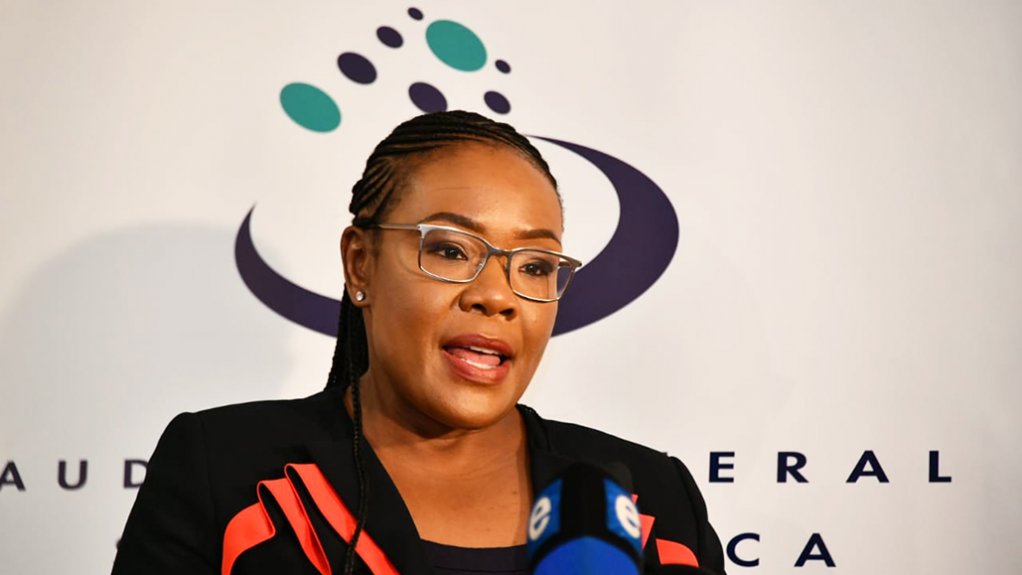By ROD AMNER
Twenty-five of SA’s 257 municipalities received a disclaimer audit opinion, Auditor-General (AG) Tsakani Maluleke said at a media briefing on Wednesday, 15 June.
Makana Municipality is one of the 25, receiving its disclaimer for the third year running.
A disclaimer is the worst result a municipality can receive from the AG, indicating that its financial statements have no value.
“If you are unable to do the very basic thing of showing what you have done with public funds, it demonstrates that you have no commitment to living up to your moral obligation to serve as a steward,” Maluleke said.
“It shows that you have absolutely no will to drive transparency and no interest in demonstrating accountability,”
When a municipality receives a disclaimed opinion, its finances are so poorly managed that it cannot provide documentary evidence to support its financial statements. This means the Auditor-General cannot form an opinion on those statements.
When a municipality receives an adverse opinion, it does not follow the correct rules and procedures and does not provide complete, accurate information to account for its spending.
The AG said poor or non-existent record-keeping was again bedevilling many municipalities, who often employed expensive consultants to try to make sense of their financials.
Makana spent almost R1 million on consultants for “asset and expenditure management”. The reason cited for the hire of the consultants was “lack of skills”.
The AG said consultants were often employed to do the “very basics,” such as VAT and tax returns, even though the municipalities have staff. The Chris Hani municipality in the Eastern Cape, for example, paid a consultant R34 million for VAT submissions.
Makana’s newly-appointed Chief Financial Officer (CFO) Nomfundo Fetcha worked as CFO for the Chris Hani Municipality when it received a disclaimer report from the AG in 2019-20.
Makana’s AG report
Here is some more detail from Makana’s damning audit opinions taken from the 2020-21 Auditor-General’s report released on 15 June 2022:
Audit outcomes
| 2016-17 | Qualified | Unchanged |
| 2017-18 | Qualified | Unchanged |
| 2018-19 | Disclaimer | Regressed |
| 2019-20 | Disclaimer | Unchanged |
| 2020-21 | Disclaimer | Unchanged |
Annual Financial Statements submitted by legislated date: No
Good quality financial statements submitted for audit: No
Financial statement qualification areas
The Auditor-General raised findings in the following areas:
- Property infrastructure plant and equipment
- Non-current assets Investment property
- Heritage assets
- Receivables
- Liabilities Payables accruals and borrowings
- Provisions and guarantees
- Other liabilities
- Capital and Reserves
- Cash flow statement
- Accounting policies changes in estimates and errors
- Contingent liabilities and commitments
- Cut-off date: Other disclosures
- Revenue from exchange transactions
- Expenditure
- Unauthorised expenditure
- Irregular expenditure
The vacancy rate in the finance unit: 17%
Consultants
Consultants used for financial report: Yes
Consultant costs: R975 152
Consultant services used for: Asset management, expenditure management legislation
Reasons for using consultants: Lack of skills
Reasons why consultants were ineffective: Lack of records and documents
Performance report
| 2020-21 | 2019-20 | 2018-19 | 2017-18 | 2016-17 | |
|---|---|---|---|---|---|
| Submitted on time | Yes | Yes | Yes | Yes | Yes |
| Useful | No | No | No | No | No |
| Reliable | No | No | Yes | No | No |
| Performance Report | Yes | Yes | Yes | Yes | Yes |
| Good Quality | No | No | No | No | No |
Compliance with legislation
The Auditor-General raised findings in the following areas:
- Procurement and contract management legislation
- Prevention of irregular expenditure
- Legislation on effecting consequences
- Strategic planning and performance management legislation
- Asset management legislation
- Revenue management legislation
- Material misstatement or limitations in submitted annual financial statements
Supply chain management
The Auditor-General raised findings in the following areas:
- Competitive and unfair procurement
- Irregular expenditure related to SCM
Infrastructure maintenance
Repairs and maintenance expenditure on infrastructure assets: R0
Repairs and maintenance expenditure on infrastructure assets as a percentage of infrastructure assets: 0%
Internal controls
Internal control assessment: Intervention required
Financial management controls
Proper record-keeping: Intervention required
Daily and monthly controls: Intervention required
In-year and year-end reporting: Intervention required
Review and monitor compliance: Intervention required
Root causes
Key officials lack appropriate competencies
| Slow response | No Response | |
|---|---|---|
| Political leadership | No | No |
| Management | Yes | No |
| Oversight | No | No |
Municipal vacancies
Overall municipal vacancies: 44%


